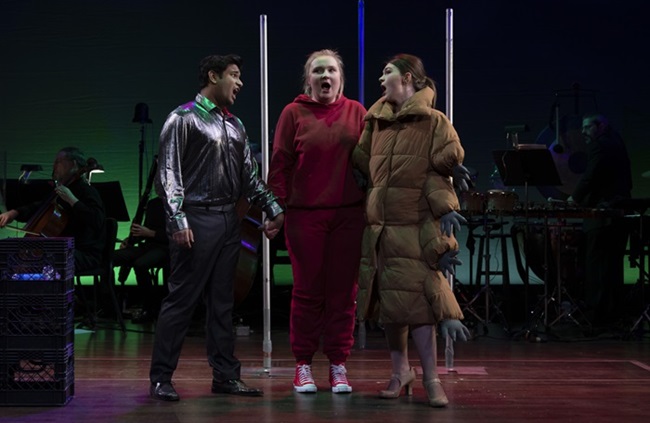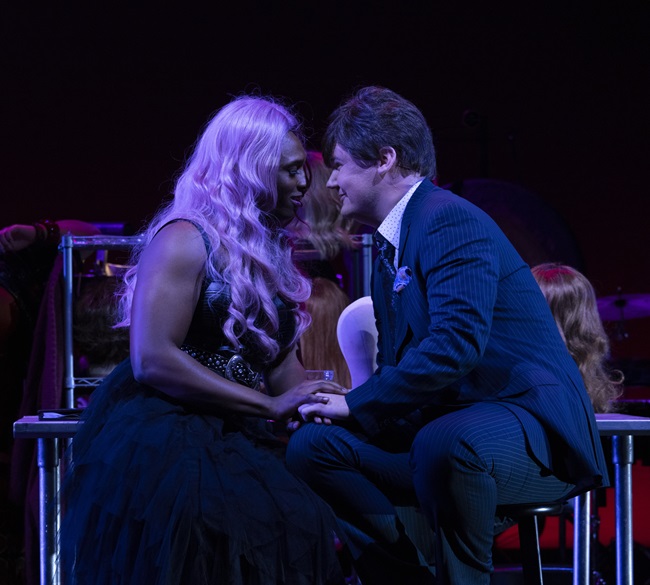A three-character opera lasting 20 minutes is not a vast canvas, and it turns out that less can be more in a mini-opera. The most successful of the three new works, Forever by Elizabeth Gartman, was also the most frivolous, at least on the surface. Set to a libretto by Melisa Tien, it featured two PFAS chemical molecules (per-and polyfluoroalkyl substances, colloquially known as “forever chemicals”) in a post-apocalyptic sludge long after humans are extinct and then making an unexpected bond with a frisky tardigrade (the resilient micro-animal sometimes called a “water bear”).
By Charles T. Downey for the Washington Classical Review

Sahel Salam, Teresa Perrotta, and Cecelia McKinley performed in Elizabeth Gartman’s Forever for Washington National Opera Friday night. (Photo: Bronwen Sharp)
Washington National Opera earns its middle name every time it mounts an American opera. The company’s American Opera Initiative bears fruit each year with the world premiere of three 20-minute operas by rising composers and librettists. Now in its 11th season, the program presented the newest trio of works Friday night in the Kennedy Center Terrace Theater.
A panel of mentors guides the three librettist-composer pairs through the development and completion of each opera. Christopher Cano, who succeeded Robert Ainsley as director of WNO’s Cafritz Young Artists and AOI at the start of last season, introduced the evening. This year, short videos preceded each work, showing the rehearsal process and featuring the thoughts of the creators and their interpreters, who are all Cafritz Young Artists.
A three-character opera lasting 20 minutes is not a vast canvas, and it turns out that less can be more in a mini-opera. The most successful of the three new works, Forever by Elizabeth Gartman, was also the most frivolous, at least on the surface. Set to a libretto by Melisa Tien, it featured two PFAS chemical molecules (per-and polyfluoroalkyl substances, colloquially known as “forever chemicals”) in a post-apocalyptic sludge long after humans are extinct and then making an unexpected bond with a frisky tardigrade (the resilient micro-animal sometimes called a “water bear”).
Soprano Teresa Perrotta, who was one of the vocal highlights of last year’s Grounded, displayed remarkable power, agility, and dramatic presence as PFAS 1, outshone only in comic exuberance by tenor Sahel Salam as PFAS 2. Cecelia McKinley plied her robust contralto to make a surprisingly alluring Tardigrade, costumed in a puffy coat with many sleeves and hands (costumes designed by Timm Burrow).
The silliness of the action (with a climax including the loud singing of the word “Polyamory!”) did not diminish the heavy underlying issue, climate change and plastic pollution. Tien’s libretto provoked a lot of laughter in the audience, for example, in the disparate origins of the two PFAS molecules (one from a luxury watch band and the other a lowly fast-food wrapper). Gartman’s inventive score featured the repeated crunching of plastic objects by the percussionist, a gesture echoed at the end when the two PFAS singers endlessly twisted plastic bottles.
Overly earnest seriousness weighed down both of the other works a bit, confronting issues that probably need more than twenty minutes to handle adequately. Sam Norman’s libretto for Hairpiece dealt with a wigmaker named Esther, who agrees to help Ari, a young trans woman, acquire a new wig that will make her feel more feminine. The issue seemed particularly relevant to the composer, Joy Redmond, herself a trans woman.
Tiffany Choe’s pliant soprano suited the feisty Esther, who seemed to be the focus of the opera until Ari arrived. Tenor Jonathan Pierce Rhodes delivered a sympathetic and nuanced interpretation of Ari, extending the dramatic range he has already shown in Blue and The Passion of Mary Cardwell Dawson last year. The crisis of the story is that Ari, dressed in false breasts and a champagne pink fright wig, was mistaken for a drag queen by a man named Gale, played with otherwise affable qualities by baritone Justin Burgess.

Jonathan Pierce Rhodes (Ari) and Justin Burgess (Gale) in Joy Redmond’s Hairpiece for Washington National Opera (Photo: Bronwen Sharp)
While Redmond’s musical style tended toward the chaotic, in a score overstuffed with a panoply of musical styles, Laura Jobin-Acosta hewed to the plain and staid in her contribution, called A Way Forward. The libretto by José Alba Rodríguez centered on three generations of an immigrant Mexican family and its bakery: a conservative grandmother who wants to preserve traditions, a son who wants to modernize the business, and a Gen Z granddaughter who finds a way to satisfy both sides, somewhat predictably, by manipulating social media.
The refulgent mezzo-soprano Winona Martin, who made an impression during an earlier apprenticeship at Wolf Trap Opera, anchored the piece as the stiff-necked abuela, Helena. Bass Sergio Martínez gave a potent rendition of Gabriel’s sober aria (“I’m the son”), but soprano Kresley Figueroa, while dramatically convincing, sounded pinched and thin in the upper reaches as the young Julia.
Conductor David Bloom made an auspicious WNO debut at the podium, ably managing both the thirteen-person chamber orchestra, spread out unevenly at the back of the stage, and the singers. Director Chloe Treat, also in her company debut, suggested the three settings with a smattering of objects and set pieces. The most inventive semi-staging came in Forever, centered on three poles and some plastic cartons for the PFAS chemicals to dart around in. A large mirror propped up to one side of the stage evoked the pool of mercury where the Tardigrade swam, grinning like a dystopian Cheshire Cat.
WNO will not return to the Kennedy Center Opera House until its production of Puccini’s Turandot, May 11 to 25. kennedy-center.org